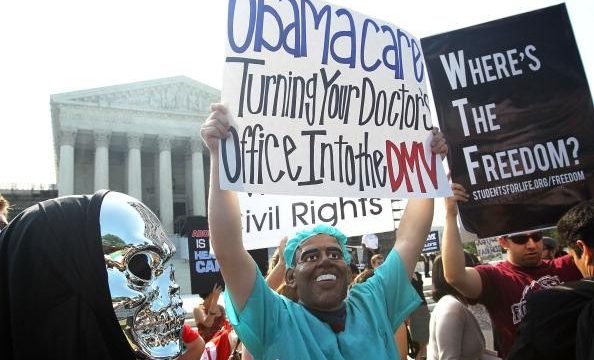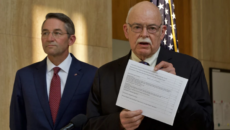What's The Worst That Could Happen: Obamacare Data Hub Will Centralize Your Financial, Health Care Information

With the NSA scandal in the headlines, Americans are becoming a little more sensitive about what data the government collects on us. But it’s not just the NSA that’s collecting our emails, and documenting our phone calls. Thanks to Obamacare, the federal government will soon have a massive central database containing our financial and health care information that they’re going to be sharing with state governments and even private contractors:
The Health and Human Services Department earlier this year exposed just how vast the government’s data collection efforts will be on millions of Americans as a result of ObamaCare.
Sen. Max Baucus, D-Mont., asked HHS to provide “a complete list of agencies that will interact with the Federal Data Services Hub.” The Hub is a central feature of ObamaCare, since it will be used by the new insurance exchanges to determine eligibility for benefits, exemptions from the federal mandate, and how much to grant in federal insurance subsidies.
In response, the HHS said the ObamaCare data hub will “interact” with seven other federal agencies: Social Security Administration, the IRS, the Department of Homeland Security, the Veterans Administration, Office of Personnel Management, the Department of Defense and — believe it or not — the Peace Corps. Plus the Hub will plug into state Medicaid databases.
And what sort of data will be “routed through” the Hub? Social Security numbers, income, family size, citizenship and immigration status, incarceration status, and enrollment status in other health plans, according to the HHS.
The Center for Consumer Information & Insurance Oversight at the Centers for Medicare & Medicaid Services says hey, no worries, because no consumer information is going to be stored and privacy is the “highest priority.”
For all marketplaces, CMS is also building a tool called the Data Services Hub to help with verifying applicant information used to determine eligibility for enrollment in qualified health plans and insurance affordability programs. The hub will provide one connection to the common federal data sources (including but not limited to SSA, IRS, DHS) needed to verify consumer application information for income, citizenship, immigration status, access to minimum essential coverage, etc. CMS has completed the technical design, and reference architecture for this work, is establishing a cross-agency security framework as well as the protocols for connectivity, and has begun testing the hub. The hub will not store consumer information, but will securely transmit data between state and federal systems to verify consumer application information. Protecting the privacy of individuals remains the highest priority of CMS.
Except, the Centers for Medicare & Medicaid Services portrayed the data hub much differently in a regulatory filing from earlier this year:
In accordance with the requirements of the Privacy Act of 1974, CMS is establishing a new system of records titled, “Health Insurance Exchanges (HIX) Program,” to support the CMS Health Insurance Exchanges Program established under provisions of the Affordable Care Act (PPACA) … The system of records will contain personally identifiable information (PII) about certain individuals who apply or on whose behalf an application is filed for eligibility determinations for enrollment in a qualified health plan (QHP) through an Exchange, and for insurance affordability programs.
“Among the listed ‘entities who may receive disclosures under routine use’ without your consent are federal agencies, state agencies, agency contractors, consultants, CMS grantees and non-profit entities operating exchanges for states,” writes J.D. Tuccille for Reason.
And those are just the entities authorized to access this information. What about unauthorized access from rogue employees or hackers? Or just plain old government mission creep as they begin using this data for purposes it was never intended to be used for?
This is the problem with government solutions to issues like health care. When you ask the government to step in, the government steps in and gets access to all sorts of private information and the authority set policy about what personal choices you can and cannot make.







